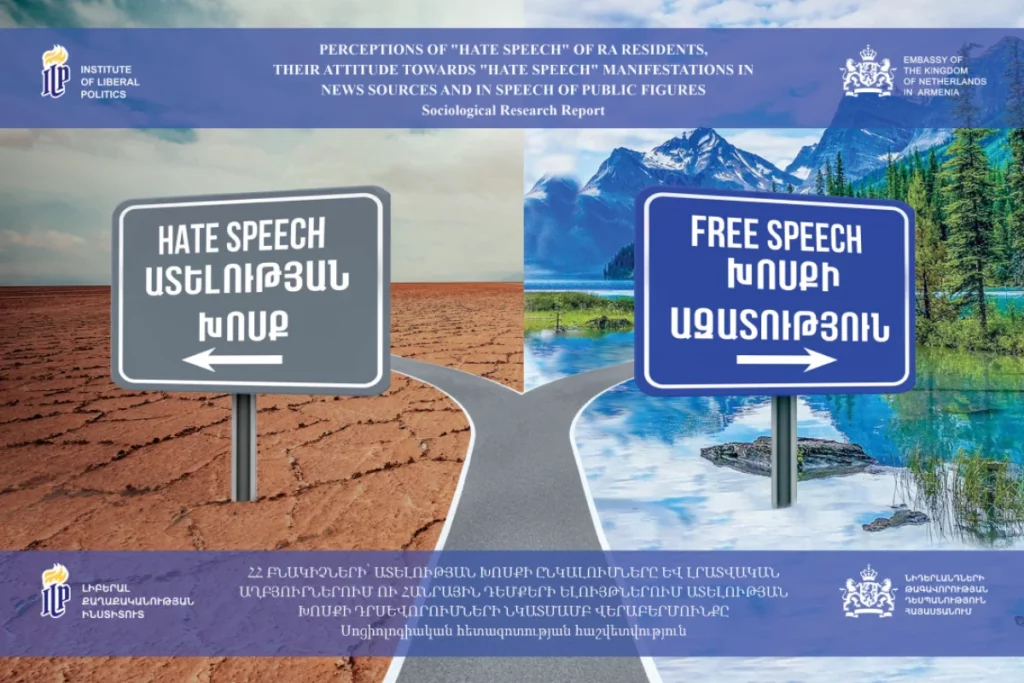Sociological Research on Perceptions of “Hate Speech” of RA Residents, Their Attitude Towards “Hate Speech” Manifestations in News Sources and in Speech Figures
DATE
December 2022- January 2023
Client
“Institute of Liberal Politics” NGO, Embassy of the Kingdom of the Netherlands in Armenia
Service
Sociological Research, Data Collection, Analysis, and Focus Group Coordination
Category
Social Research, Public Awareness, Hate Speech Analysis, Civic Engagement

Overview
In recent years, the Republic of Armenia has grappled with a rising prevalence of hate speech, encompassing insults, slander, and calls for violence within its public discourse. Understanding the manifestations, impact, and potential remedies for hate speech is crucial for effectively addressing this issue within the Armenian context.
To comprehend how Armenian society perceives hate speech, identify platforms responsible for its dissemination, gauge its impact on individuals and communities, and propose effective measures to combat its proliferation, the “Institute of Liberal Politics” NGO, an independent think tank, initiated a research in the framework of the “Fight against hate speech to establish pluralism and tolerance in a democratic society” project funded by the support of the Embassy of the Kingdom of the Netherlands in Armenia.
SPRING PR was entrusted to implement the quantitative data collection and analysis as well as the focus group discussion coordination.
The detailed report may be found here.
Implementation
In executing the research on hate speech in Armenia, SPRING PR adopted a comprehensive methodology aimed at unearthing the perceptions, experiences, and societal impact of hate speech across diverse segments of the Armenian population. The research was structured around specific objectives, encompassing a range of socio-demographic factors to provide an understanding of the issue.
Research Methodology:
The research employed the efficient and systematic Computer-Assisted Telephone Interviewing (CATI) method. A total of 14,813 calls were made to fill out 1,060 valid questionnaires, resulting in a response rate of 7.2%. For the remaining 13,753 (92.8%) calls, no survey was conducted for various reasons:
a) 9,854 people (66.5%) refused to participate in the survey,
b) the selected phone number did not exist in 2,308 cases (15.5%),
c) in 1,312 cases (8.9%), there was no respondent corresponding to the quota,
d) calls to 279 phone numbers (1.9%) were not answered at different hours of the day.
The analysis of the data collected during the research on “hate speech” allowed us to draw a number of conclusions, some of which are as follows:
- 37.7% of respondents have some idea about “hate speech” and their answers contain certain elements of this definition: “An expression of discriminatory attitude, public speech that expresses hate or encourages violence towards a person or group.”
- Most of the respondents have personally encountered “hate speech”. 62.7% – sometimes, and 9.9% – very often.
- Residents of Yerevan face “hate speech” more often than residents of other cities and villages of RA.
- According to the respondents, people in our country most often encounter the following manifestations of “hate speech”: labeling political views (18.7%) and mocking a person’s appearance (18.5%), less often criticizing sexual orientations (14.5%), questioning mental abilities (11.5%) and insulting nationality (10.2%).
These findings provide critical insights into the prevalence, manifestations, and impact of hate speech in Armenia, offering a solid foundation for future interventions to foster a more tolerant and inclusive society. The identified patterns of hate speech propagation will guide stakeholders in implementing effective strategies to counteract this destructive phenomenon and promote a culture of understanding and respect.